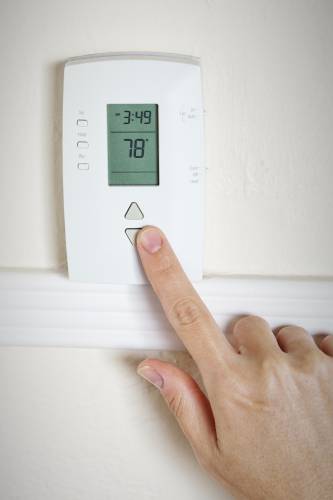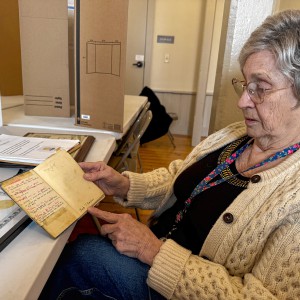Dealing with ‘sticker shock’: What customers can do as energy bills spike

Turn down the thermostat at home to save some money on your heating bills. DS011
| Published: 02-18-2025 5:56 PM |
When Tom Condardo opened his February Eversource bill and found a whopping $894 figure staring back at him, he said it was “kind of a sticker shock.”
It has come as no surprise that it costs more to heat a home during these bitterly cold months, but for myriad Pioneer Valley residents, energy bills have continued to climb to unsustainable levels. Just last February, Condardo’s roughly 2,400-square-foot Longmeadow home brought in a $603 bill — no meager sum, but significantly less than he had to pay this winter.
Energy companies attribute the spike to multiple factors, such as increased usage, natural gas supplies, infrastructure upgrades and more. As legislators call for the cost burden of such changes to be shifted away from customers, ratepayers may be able to take some steps to ease their financial strain in the meantime.
“Energy rate increases are out of control and the people hurting are my constituents,” said state Sen. Jo Comerford, D-Northampton. “These rate increases are unsustainable and they’re injurious and the DPU must act to rein in utilities.”
Comerford was one of more than 80 legislators led by state Sen. Jake Oliveira, D-Ludlow, to sign a letter to Department of Public Utilities Chair James Van Nostrand to review recently approved energy rate increases. These increases were approved for investor-owned utility companies, including Eversource and National Grid.
Oliveira was not available for comment on Tuesday, but in a statement he said that “time and again, we see profits prioritized over the well-being of Massachusetts families. We cannot allow utility companies to impose unpredictable and excessive financial burdens on ratepayers without proper oversight.”
Other area legislators to sign the letter include state Sens. John Velis and Paul Mark, and Reps. Natalie Blais, Mindy Domb, Lindsay Sabadosa, Aaron Saunders and Homar Gomez.
The governor on Sunday also demanded that DPU and utility companies provide urgent relief to customers.
Article continues after...
Yesterday's Most Read Articles
For Condardo this year, he said “the real shock was in the cost of delivery,” rather than on the “supply” side of his bill. Delivery costs have typically been higher than supply costs in Condardo’s experience, but this year, Eversource announced some changes. In western Massachusetts, where Eversource operates Eversource Gas of Massachusetts (EGMA) using a former Columbia Gas system it acquired in 2020, some of the delivery charge increase comes from the more than $77 million in investments needed to upgrade this system to meet Eversource’s safety standards.
“Columbia left behind kind of a mess for them, that’s understandable … it’s the other areas where it feels like they’re trying to take advantage of the situation,” said Condardo.
Another aspect of the delivery charge increases comes from a hike in the Local Distribution Adjustment Charge to reflect growth in energy efficiency and decarbonization programs offered through sponsors of Mass Save.
Eversource explained in a statement that the shock most people are experiencing is the result of rate increases that went into effect on Nov. 1, which have now become more apparent due to increased use amid colder weather.
“January 2025 was about 15% colder than December 2024 and 10% colder than January 2024. This much colder weather driving increased usage, coupled with the rate adjustments that took effect in November 2024, are the primary factors impacting customers’ current bills,” the statement reads. “How much energy a customer uses ultimately impacts both the supply and delivery portions of the bill. It’s important to note that even if customers do not raise their thermostats, more energy is used to maintain the same temperature setting in colder weather.”
The increase also includes increases in supply costs, which Eversource stated are “vulnerable to market forces and typically increase during the winter months, fluctuating year-to-year based on market conditions and weather.”
The cost of natural gas that Eversource purchases from the market also significantly increased in January, driven both by extremely cold temperatures in supply regions and high usage. The company is required to adjust the gas supply rate if costs increase or decrease by more than 5%, and such a change was triggered by this increase.
This increase went into effect Feb. 1 for EGMA customers, increasing the cost of gas rate for residential heating customers from $0.7920 per therm to $0.9392 per therm.
Eversource spokesperson William Hinkle encouraged customers to reach out to the utility to explore payment options to ease the potential financial burdens of these rate increases. One potential recourse, he said, is opting into an energy efficiency program.
While the expansion of these programs is one reason why delivery fees have increased, Hinkle said that by opting into these programs, customers will find that “their bills are lower than they otherwise would be,” because they are making their homes more energy efficient.
For those who meet certain income qualifications, there is the New Start Program, which can help customers pay off outstanding payments in as little as 12 months as long as they make on-time monthly payments. Eversource will make up the difference by eliminating or forgiving a portion of the total balance, reducing the amount that is owed each month. Discount rates are also available to income qualifying customers receiving public assistance benefits.
Other payment programs are available to all customers, like flexible payment plans.
“Our customer service representatives will work with you one on one … to help you pay down that unpaid balance over time,” Hinkle explained.
Eversource also has budget plans that allow customers to pay a fixed amount each month based on average annual usage, avoiding monthly spikes, which Hinkle said “is a good option for people who are kind of trying to plan their household for the year ahead.”
The state also offers the Home Energy Assistance Program, a free resource that helps eligible residents pay portions of their heating bills.
Eversource will also be hosting a webinar on Thursday from 1 to 2 p.m. for EGMA customers who wish to learn more about these programs. Advance registration is required and can be completed at Eversource.com. More online and in-person events will be scheduled in the coming weeks.
National Grid offers many similar programs, such as discount rates and even no-cost energy efficiency upgrades for income qualifying customers, budget billing plans, and no-cost home energy assessments through which customers can get customized energy reports and some energy-saving products.
National Grid also encourages eligible consumers to look into Low-Income Home Energy Assistance Program, commonly referred to as Fuel Assistance, which helps households pay a portion of their winter heating bills. They also recommend the Massachusetts Good Neighbor Energy Fund, which helps those facing temporary financial difficulty who cannot meet a month’s energy expense but are not eligible for state or federal energy assistance.
In addition, National Grid offers rebates and incentives for energy saving initiatives such as home weatherization and energy-saving products and programs.
Alexa Lewis can be reached at alewis@gazettenet.com.






 Sabadosa, Velis push for state endometriosis task force to raise awareness about little-known illness
Sabadosa, Velis push for state endometriosis task force to raise awareness about little-known illness  Around the Hamptons: Four candidates advance for Easthampton police chief
Around the Hamptons: Four candidates advance for Easthampton police chief Having adapted over time, Whately Grange celebrating 85 years
Having adapted over time, Whately Grange celebrating 85 years Dash to the dealership?: Local consumers, car sellers brace for auto tariffs to kick in Wednesday
Dash to the dealership?: Local consumers, car sellers brace for auto tariffs to kick in Wednesday
